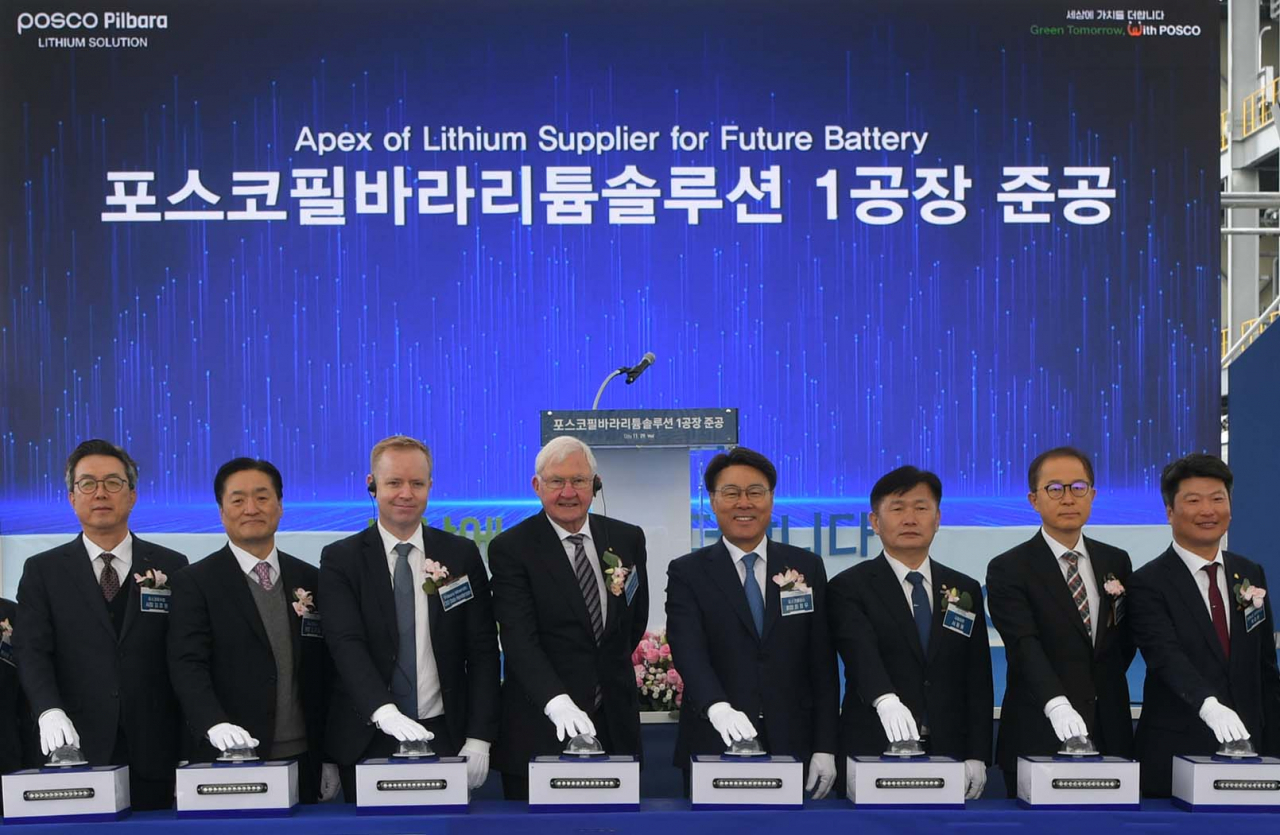 |
Posco Future M CEO Kim Jun-hyung (first from left), Pilbara Minerals CEO Dale Henderson (third from left), Pilbara Minerals Non-Executive Chairman of the Board Tony Kiernan (fourth from left) and Posco Group Choi Jeong-woo (fifth from left) pose for a photo during a ceremony celebrating the completion of its lithium hydroxide plant in the Yulchon Industrial Complex in Suncheon, South Jeolla Province, Wednesday. (Posco Holdings) |
Posco Holdings said Wednesday that the steel giant has completed the construction of the country’s first lithium hydroxide factory, a move to strengthen its competitiveness in the global lithium race.
The new facility is located within the Yulchon Industrial Complex in Suncheon, South Jeolla Province. The plant can annually produce 21,500 metric tons of lithium hydroxide, one of the key components used for batteries for electric vehicles.
The plant is owned by Posco-Pilbara Lithium Solution, a joint venture founded in 2021 between Posco Group and its partner Pilbara Minerals, an Australian lithium miner that supplies lithium ores to Posco.
“Posco-Pilbara Lithium Solution will build another lithium hydroxide plant right next to the first plant by 2024 to double the production capacity to 43,000 tons per year,” a Posco Holdings official said. The increased capacity is enough to produce about 1 million EVs.
The official added that the planned production is also expected to enjoy incentives under the US Inflation Reduction Act as the whole process from securing materials to production occurs in countries with free trade agreements with the US.
Posco said it aims to ramp up its production capacity of lithium hydroxide from lithium ores to 220,000 tons by 2030.
“The group is in discussions with its Canadian partner to build additional lithium hydroxide plants in the future,” the official said.
Adding to that, Posco also plans to build new plants that can produce lithium hydroxide by using resources from lithium brines in Argentina.
Its ultimate goal is producing a combined 423,000 tons of lithium hydroxide, extracted from lithium ores, brines and other sources, and by 2030.
On the day, Posco also announced that the group has completed the construction of a nonoriented electrical steel (NO) plant in its steel complex in Gwangyang, South Jeolla Province, as part of the group’s move to meet the increasing demand for the steel product used for EVs.
According to Posco Holdings, the plant can produce 150,000 tons of NOs, as a motor core material. The group is planning on building another NO plant with the same production capacity by 2024.
With 100,000 tons of NO production capacity of its Pohang NO plant, the group will have a total of 400,000 tons of NO production capacity by 2024, Posco Holdings added.







![[Today’s K-pop] Blackpink’s Jennie, Lisa invited to Coachella as solo acts](http://res.heraldm.com/phpwas/restmb_idxmake.php?idx=644&simg=/content/image/2024/11/21/20241121050099_0.jpg)